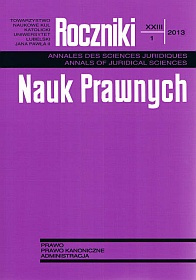Conditions of Privilege Cessation Provided by Can. 82 of CIC/83
Abstract
The presented study provides an interpretation of can. 82 of CIC/83. From the analysis it follows that the hypotheses codified in can. 82 result from positive law. The first hypothesis implies that the legislator does not allow for non-burdensome privileges to cease through prescription. This is due to the fact that a privilege holder can renounce a privilege, and this renouncement is legally valid if it has been accepted by a competent authority (can. 80, §1).
The second hypothesis implies that privileges burdensome to others cease through prescription (cann. 197-199). According to the doctrine, prescription is a similar process to a customary practice becoming law.
References
Aymans W., Mörsdorf K., Kanonisches Recht, t. I, Padeborn–Mün¬chen–Wien–Zürich: Ferdinand Schöningh 1991.
Aymans W., Privilegio, [w:] Diccionario enciclopèdico de Derecho Canónico, red. S. Haering, H. Schmitz, Barcelona: Herder 2008, s. 697-698.
Bączkowicz F., Baron F., Stawinoga W., Prawo kanoniczne, t. I, Opole: Wydawnictwo Diecezjalne św. Krzyża 1958.
Contea Coronata M., Institutiones iuris canonici ad usum utriusque cleri et scholarum, t. I, Torino: Marietti 1950.
Dzierżon G., Niezdolność do zawarcia małżeństwa jako kategoria kanoniczna, Warszawa: Wydawnictwo Uniwersytetu kard. S. Wyszyńskiego 2002.
Dzierżon G., Zrzeczenie się przywileju (kan. 80 § 1-3 KPK, „Roczniki Nauk Prawnych” 21(2011), z.2, s. 175-184.
Dzierżon G., Zasady interpretacji ustaw kościelnych ujęte w kan. 17 KPK, „Studia Teologiczno-Historyczne Śląska Opolskiego” 26(2006), s. 319-326.
Eichmann E., Kirchenrecht, t. I, Padeborn: Ferdinand Schöningh 1929.
García Martín J., Le norme generali del Codex Iuris Canonici, Roma: EDIURCLA 1999.
Keiser M., Der gute Glaube im Codex Iuris Canonici, München: Max Hueber 1965.
Labandeira E., Trattato di diritto amministrativo canonico, Milano: Giuffrè Editore 1994.
Lombardía P., Commento al can. 82 CIC, [w:] Codice di Diritto Canonico e le leggi complementari, red. J. Arrieta, Roma: Coletti a San Pietro Editore 2007, s. 115.
Michiels G., Normae generales iuris canonici, t. II, Lublin: Universitas Catholica 1929.
Pinto P.V., De normis generalibus, [w:] Commento al Codice di Diritto Canonico, red. P. V. Pinto, Città del Vaticano: Libreria Editrice Vaticana 2001, s. 1-111.
Regatillo E., Institutiones iuris canonici, Santander: Editorial «Sal Terrae» 1961.
Roca M., Comentario al can. 84 CIC, [w:] Comentario exegético al Código de Derecho Canónico, red. A. Marzoa, J. Miras, R. Rodríguez-Ocańa, t. I, Pamplona: EUNSA 1996, s. 666-667.
Socha H., Allgemeine Normen, [w:] Münsterischer Kommentar zum Codex Iuris Canonici, t. I, red. K. Lüdicke, Essen: Ludgerus Verlag 1985, ad 82.
Urresti J., Comentario al can. 82 CIC, [w:] Código de Derecho Canónico. Edición bilingüe comentada, red. L. De Echeveria, Madrid: Biblioteca de Autores Cristianos 1985, s. 68.
Urrutia F., De normis generalibus.Adnotaiones in Codicem: Liber I, Romae: Pontificia Universitas Gregoriana 1983.
Van Hove A., De privilegiis, de dispensationibus, cz. 1, t. V, Summi Pontificis, S. Congregationum Rituum et Propaganda Fide necnon Archiep. Mecheliniae–Rome: Mechlin Typographus 1939.
Copyright (c) 2013 Roczniki Nauk Prawnych

This work is licensed under a Creative Commons Attribution-NonCommercial-NoDerivatives 4.0 International License.


